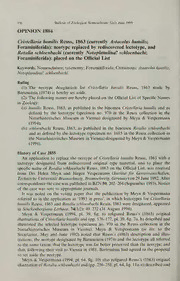
Opinion 1804 Cristellaria humilis Reuss, 1863 (currently Astacolus Humilis; Foraminiferida): neotype replaced by rediscovered lectotype, and Rotalia Schloenbachi (currently Notoplanulina? Schloenbachi; Foraminiferida): placed on the Official List PDF
Preview Opinion 1804 Cristellaria humilis Reuss, 1863 (currently Astacolus Humilis; Foraminiferida): neotype replaced by rediscovered lectotype, and Rotalia Schloenbachi (currently Notoplanulina? Schloenbachi; Foraminiferida): placed on the Official List
) 196 BulletinofZoological Nomenclature 52(2)June 1995 OPINION 1804 Cristellaria humilis Reuss, 1863 (currently Astacolus humilis; Foraminiferida): neotype replaced by rediscovered lectotype, and Rotalia schloeiibachi (currently NotoplanuUnal schloenbachi; Foraminiferida): placed on the Official List Keywords. Nomenclature; taxonomy; Foraminiferida; Cretaceous; Astacolushumilis; NotoplanuUnal schloenbachi. Ruling (1 The neotype designation for Cristellaria humilis Reuss, 1863 made by Bartenstein (1974) is hereby set aside. (2) The following names are hereby placed on the Official List ofSpecific Names in Zoology: (a) humilis Reuss, 1863, as published in the binomen Cristellaria humilis and as defined by the lectotype (specimen no. 970 in the Reuss collection in the Naturhistorisches Museum in Vienna) designated by Meyn & Vespermann (1994); (b) schloenbachi Reuss, 1863, as published in the binomen Rotalia schloenbachi and as defined by the lectotype (specimen no. 1685 in the Reuss collection in the Naturhistorisches Museum in Vienna)designated by Meyn&Vespermann (1994). History ofCase 2855 An application to replace the neotype of Cristellaria humilis Reuss, 1863 with a lectotype designated from rediscovered original type material, and to place the specific name of Rutalia schloenbachi Reuss, 1863 on the Official List, was received from Drs Helen Meyn and Jiirgen Vespermann (Institut fur Geowissenschaften, Technische UniversilatBraunschweig, Braunschweig. Germany)on29June 1992. After correspondencethecasewaspublished inBZN50: 202-204(September 1993). Notice ofthe case was sent to appropriatejournals. It was noted on the voting paper that the publication by Meyn & Vespermann referred to in the application as '1993 in press", in which lectotypes for Cristellaria humilis Reuss, 1863 and RotaliaschloenbachiReuss, 1863 weredesignated, appeared in Senckenbergiana Lethaea. 74(1/2): 49-272 (31 August 1994). Meyn & Vespermann (1994, pi. 39, fig. 6) refigured Reuss's (1863) original illustrations ofCristellariahumilis and (pp. 176-177, pi. 39, fig. 7a, b) described and illustrated the selected lectotype (specimen no. 970 in the Reuss collection in the Naturhistorisches Museum in Vienna). Meyn & Verspemiann (in lilt, to the Secretariat, May and June 1992) noted that Reuss's (1863) description and illus- trations, the neotype designated by Bartenstein (1974) and the lectotype all referred to the same taxon; that the lectotype was far better preserved than the neotype; and that, following their visit to Vienna in 1988, Bartenstein had agreed to the proposal to set aside the neotype. Meyn & Vespermann (1994. pi. 64. fig. 10) also refigured Reuss's (1863) original illustration ofRotaliaschloenbachiand (pp. 256-258, pi. 64, fig. 1la-c)describedand . BulletinofZoological Nomenclature 52(2)June 1995 197 figured the lectotype(specimen no. 1685 in the Reusscollection in Vienna). Meyn & Vespermann (in lilt, to the Secretariat, June 1992) noted that Reuss's (1863) description and illustration, the neotype invalidly designated by Crittenden & Price (1991),and thelectotypeallreferred tothesametaxon.Theyalsonoted: 'Wereceived a letter from Crittenden in 1991 in which he admitted that they [Crittenden & Price, 1991] were 'a trifle premature' in designating a neotype for Rotalia schloenbachC Theproposals relatingto CristellariahumilisReuss, 1863 and Rotaliaschloenbachi Reuss, 1863, published in BZN 50: 203, were offered separately for voting. Decision ofthe Commission On 1 December 1994 the members ofthe Commission were invited to vote on the proposals published in BZN 51: 203. At the close ofthe voting period on 1 March 1995 the votes were as follows: Proposals (1) and (2)—(a) (Cristellaria humilis Reuss, 1863): Affirmative votes 24: Bayer, Bock, Bouchet, Cocks, Corliss, Dupuis, Hahn, Heppell, Holthuis, Kabata. Kraus, Lehtinen, Macpherson, Mahnert, Martins de Souza, Minelli, Ni—elsen, Nye, Ride, Savage, Schuster, Stys, Thompson, Willink Negative votes 1: Halvorsen. Proposal (2)(b) (Rota—lia schloenbachi Reuss, 1863): Affirmative votes 21: Bayer, Bock, Bouchet, Cocks, Corliss, Dupuis, Hahn, Heppell, Holthuis, Kabata, Lehtinen, Macpherson, Mahnert, Minelli, Nielsen, Nye, Ride, Savage, Schuster, Thompson, Willink — Negative votes 4: Halvorsen, Kraus, Martins de Souza and Stys. No votes were received from Cogger, Starobogatov, Trjapitzin and Ueno. Kraus commented: T vote against the proposal relating to Rotaliaschloenbachias the invalidityoftheneotypedesignation byCrittenden & Price(1991) is unquestion- able; there is no reason why schloenbachi should be placed on the Official List'. Original references ThefollowingaretheoriginalreferencestothenamesplacedonanOfficialListbytheruling given in the present Opinion: humilis, Cristellaria Reuss, 1863, Sitzungsberichte der Kaiserlichen Akademie der Wissen- schaften. Malhemalisch-Naturwissenschaftliche Classe. 46(1): 65. schloenbachi. Rotalia, Reuss, 1863, Sitzungsberichte der Kaiserlichen Akademie der Wissen- schaften. Matliematisch-Nalurwissenschaftliche Classe, 46(1): 84. The following is the reference for the designation oflectotypes of Cristellaria humilis and Rotaliaschloenbachi. both ofReuss (1863): Meyn, H. & Vespermann, J. 1994. Senckenbergiana Lethaea, 74(1/2): 176 and 256 (respectively).
